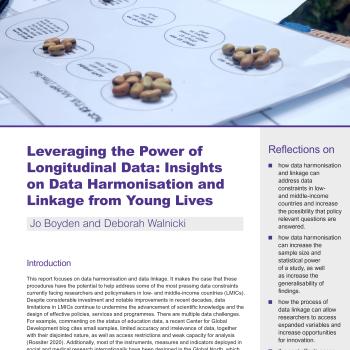
This report has been written for Young Lives' ESRC funded work capturing methodological learning from our 20 year longitudinal study. It focuses specifially on data harmonisation and data linkage and makes the case that these procedures have the potential to help address some of the most pressing data constraints currently facing researchers and policymakers in low- and middle-income countries (LMICs).
Despite considerable investment and notable improvements in recent decades, data limitations in LMICs continue to undermine the advancement of scientific knowledge and the design of effective policies, services and programmes. There is a huge need to improve both the quality and the consistency, as well as the comparability and integration, of LMIC data. The report considers the specific challenges of longitudinal research and also the unique scientifc and policy advantages it offers in LMICs. The authors argue that data harmonisation and data linking can be an important asset to longitudinal research in LMICs, extending the reach and enhancing the impact of longitudinal evidence at limited additional cost.
Focusing mainly on cohort research, this paper enumerates the aims and approaches of recent harmonisation and linking initiatives and underlines some of the opportunities and challenges involved. In particular, it highlights learning from Young Lives, a longitudinal study of 12,000 young people in Ethiopia, India,1 Peru, and Vietnam.
For more on Young Lives methodological lessons and learning project visit our webpage here.

This report has been written for Young Lives' ESRC funded work capturing methodological learning from our 20 year longitudinal study. It focuses specifially on data harmonisation and data linkage and makes the case that these procedures have the potential to help address some of the most pressing data constraints currently facing researchers and policymakers in low- and middle-income countries (LMICs).
Despite considerable investment and notable improvements in recent decades, data limitations in LMICs continue to undermine the advancement of scientific knowledge and the design of effective policies, services and programmes. There is a huge need to improve both the quality and the consistency, as well as the comparability and integration, of LMIC data. The report considers the specific challenges of longitudinal research and also the unique scientifc and policy advantages it offers in LMICs. The authors argue that data harmonisation and data linking can be an important asset to longitudinal research in LMICs, extending the reach and enhancing the impact of longitudinal evidence at limited additional cost.
Focusing mainly on cohort research, this paper enumerates the aims and approaches of recent harmonisation and linking initiatives and underlines some of the opportunities and challenges involved. In particular, it highlights learning from Young Lives, a longitudinal study of 12,000 young people in Ethiopia, India,1 Peru, and Vietnam.
For more on Young Lives methodological lessons and learning project visit our webpage here.

